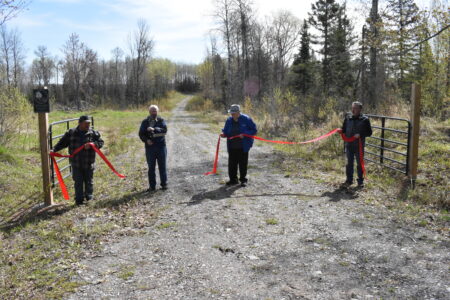List of counties against gravel legislation grows
Keweenaw supports retaining local control of aggregate mines
By GRAHAM JAEHNIG
gjaehnig@mininggazette.com
KEWEENAW COUNTY — The County Board at its regular monthly meeting July 19 joined the growing list of counties supporting opposition to an attempt by downstate lobby groups to eliminate local control over sand and gravel mining operations, placing all regulatory control in the hands of the state.
A motion made by Commissioner Randy Eckloff and supported by Commissioner Bob Demarois, unanimously carried to join the U.P. Association of County Commissioners in opposition to House Bills 4526, 4527 and 4528 regarding local preemption for the siting and regulation of aggregate mines.
If these bills pass, no local regulations could apply to operation issues that are inherently local in nature, including hours of operation, truck routes, noise, dust control and fencing.
According to the Michigan Municipal League, the legislation jeopardizes existing relationships between mine operators and local governments, shifting all new and expanding operations to state oversight–under a to-be-created permitting and regulatory system within the Michigan Department of Environment, Great Lakes, and Energy (EGLE). The three-bill package would transfer this existing local government-permitted operations to state oversight without any consent of the local unit that approved and oversees the original permit. Seven Republicans and six Democrats are co-sponsors.
On May 10, 2023, Michigan Radio reported that the sand and gravel industry says local governments are holding back progress. With Gov. Gretchen Whitmer’s “Fix the damn roads” campaign, more sand, gravel and other aggregates are needed for road beds and concrete. But industry leaders say local governments are getting in the way.
The report goes on to say that gravel mining companies say townships are too frequently denying the permits.
Construction unions and the Michigan Chamber of Commerce support the bills, says Michigan Radio. The Michigan Aggregates Association, a lobbying group, claims it represents the sand and gravel industry.
On May 9, 2023, Doug Needham, executive director of MAA, testified in the Michigan House of Representatives Regulatory Reform Committee in support of the bills.
The MAA website reported on May 12 that Needham testified that “this vital legislation would give oversight of the aggregates permitting process to the Michigan Department of Environment, Great Lakes, and Energy (EGLE). This legislation will help fix Michigan’s broken road building supply chain, stretch our infrastructure dollars further, and support our trades workforce. The legislation will also help protect our environment with CO2 reductions and land reclamation requirements.”
Needham, according to the May 10 Michigan Radio report, has argued that local governments are not qualified to make decisions about whether an aggregate mine should be approved.
“Local officials do not have the insight into the importance of material to state and federal construction projects,” the report quoted Needham as saying. “The supply chain is broken. Simple economics state when there’s a high demand for product, it’s in short supply, prices increase.”
Needham’s claim that aggregate is in short supply in Michigan, however, is not supported by The U.S. Geological Survey. The USGS 2018 Minerals Yearbook of Sand and Gravel, Construction, reported that Michigan ranks 4th on the list of the 10 leading states that produce sand and gravel, behind California, Texas and Arizona.
In regard to his claim that local governments are not qualified to make decisions regarding aggregate mines, the Michigan Townships Association flatly rejects it.
“Residents elect their local leaders to act on their behalf for the best interests of the community and the people they serve,” said Neil Sheridan, MTA executive director, in a release. “This legislation is a solution in search of a nonexistent problem. The truth is that the vast majority of sand and gravel permits are timely approved by local governments, and local officials and mining operators report decadeslong positive working relationships. When an issue or concern arises, residents turn to their local leaders for assistance and action. This legislation eliminates that ability for officials to advocate for and safeguard their community. Michigan communities and residents deserve a better voice in their quality of life.”
The MML also dismissed Needham’s allegation. Dan Gilmartin, executive director, is quoted in the same release as saying:
“Cities and villages in Michigan are responsible for maintaining over 21,000 miles of roads. They understand as well as anyone the importance of controlling costs and maximizing available resources.”
Local zoning is intended to protect local residents, MTA argues, and local officials understand the importance of building strong communities, protecting public health and safety and improving quality of life.
“We support access to aggregate materials necessary to fix Michigan’s roads,” the MTA goes on to state. “The current process allows for local governments to balance those needs along with those of their community.”




